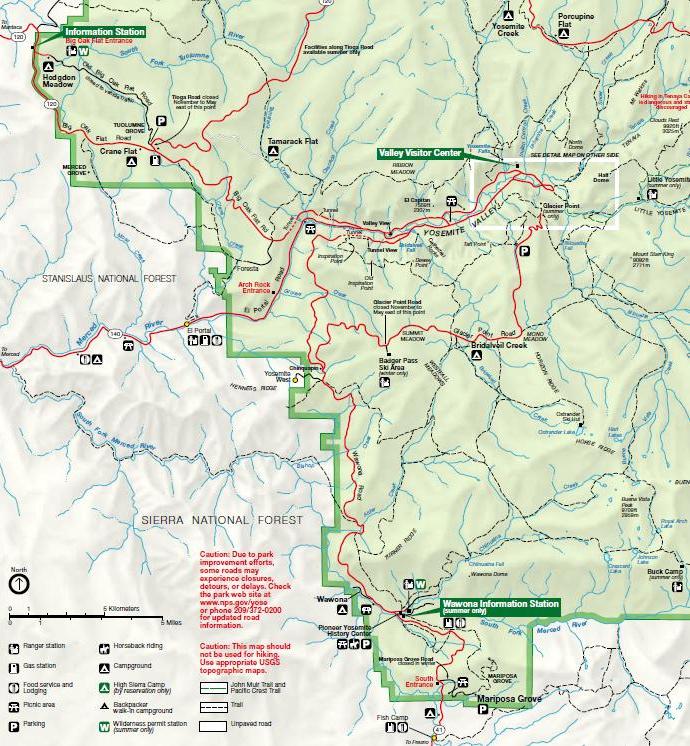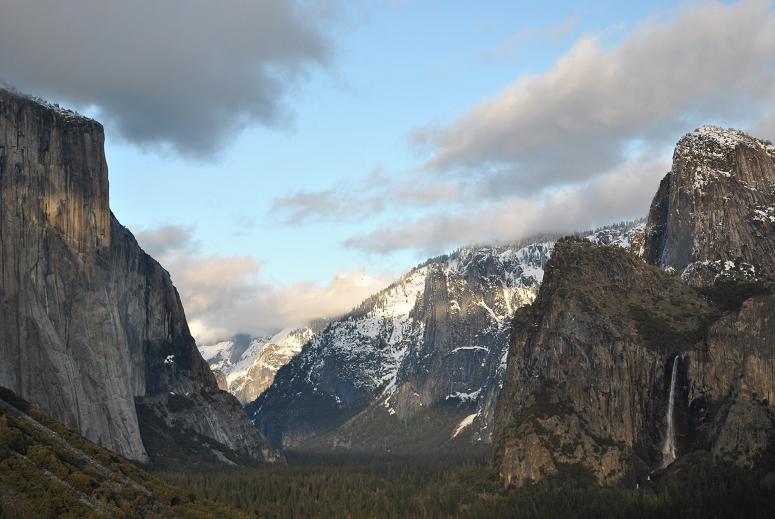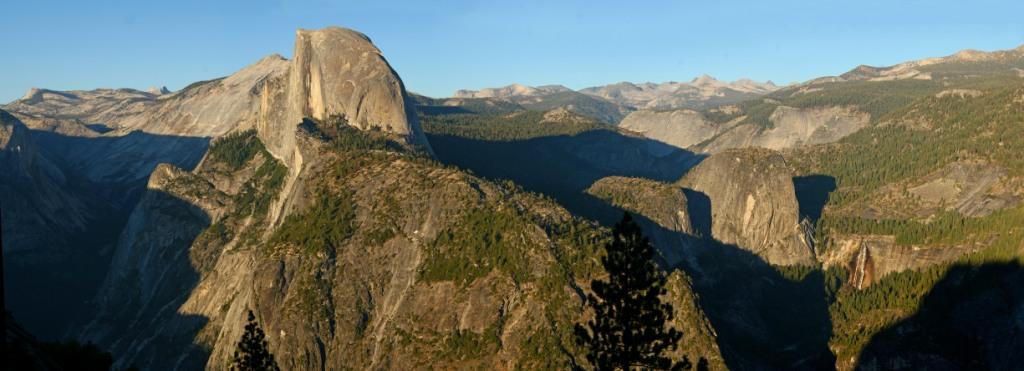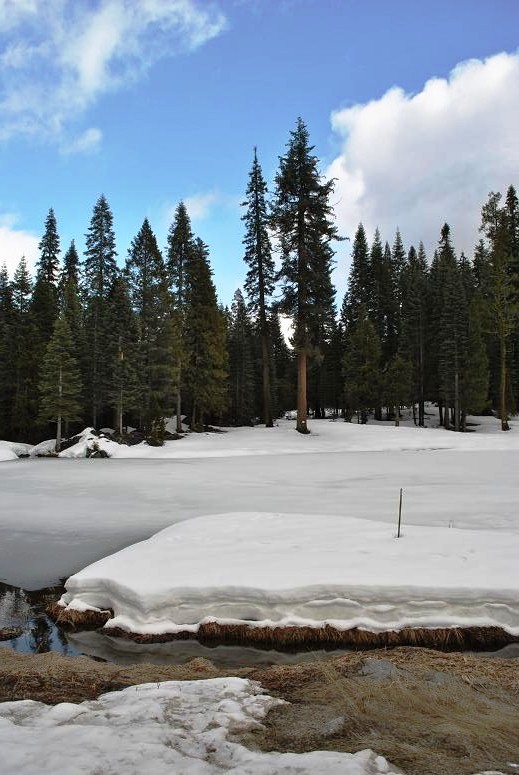Yosemite National Park - Guide to California's Yosemite National Park
Yosemite National Park is one of the premier national park of North America. It is the third most visited national park in the entire United States. Yosemite is internationally recognized park with breath taking granite cliffs, waterfalls, worlds tallest sequoia trees spread out at 1,200 square-mile park with thousands of lakes and ponds. The park contains 350 miles of roads and 800 miles of hiking trails that including hiking on top of water falls.

Popular features of Yosemite National Park
Yosemite Valley represents only one percent of the park area, but this is where most visitors arrive and stay. The Tunnel View is the first view of the Valley for many visitors and is extensively photographed. El Capitan, a prominent granite cliff that looms over Yosemite Valley, is one of the most popular rock climbing destinations in the world because of its diverse range of climbing routes in addition to its year-round accessibility. Granite domes such as Sentinel Dome and Half Dome rise 3,000 and 4,800 feet (910 and 1,500 m), respectively, above the valley floor.
The high country of Yosemite contains beautiful areas such as Tuolumne Meadows, Dana Meadows, the Clark Range, the Cathedral Range, and the Kuna Crest. The Sierra crest and the Pacific Crest Trail run through Yosemite, with peaks of red metamorphic rock, such as Mount Dana and Mount Gibbs, and granite peaks, such as Mount Conness. Mount Lyell is the highest point in the park, standing at 13,120 ft. The Lyell Glacier is the largest glacier in Yosemite National Park and is one of the few remaining in the Sierra Nevada today.
The park has three groves of ancient Giant Sequoia (Sequoiadendron giganteum) trees; the Mariposa Grove (200 trees), the Tuolumne Grove (25 trees), and the Merced Grove (20 trees). This species grows larger in volume than any other and is one of the tallest and longest-lived.
Driving Destinations in Yosemite National Park
Most parts of Yosemite National Park can be traveled by a car. Best scenic route to enter the park is from Route 120 east from Tioga Pass Road where it is only opened from June through October (see the map below). While entering the park from most northern end you should first visit Mono Lake and Bodie State Park, a well-preserved gold mining ghost town. This northern route will take you to gradual climb of Sierra Nevada Mountain from the plains of Northern California. This northern route will take you high up in the mountains where the road is 2 lane highway featuring tunnels and 4,000-5,000 foot steep drops on the side of main road; Do not forget to stop on the turnout to view the scenic valley below from high up in the mountains.
Drive to Yosemite Valley with spectacular granite walls. You will be mesmerized by shear 3,000 feet or more vertical rock walls and the spider-like rock climber who make this their pilgrimage to scale those cliffs. Have a high zoom video camera to view those climber high up in the cliffs from way below the base of the cliffs. In the Yosemite Valley right by the Merced River visit Bridalveil Fall, Horse Trail Fall, and Yosemite Falls are within walking distance from parking lot. Most fall depending on the winter season snow fall has less water during the July to August summer season. It is recommend to visit Yosemite during the start of Spring to see those breath taking 2,000 ft tall water falls. Visiting Nevada and Vernal Falls require small hike from the main road. Hike from Happy Isles shuttle bus stop on the 4-mile long Mistry Trail to Vernal Fall and take the Vernal Fall footbridge to get an excellent views of the 317 foot (97 m) high Vernal Fall. Hike past the Vernal Falls in Misty Trail to strenuous hike to the top of Nevada Fall.

View of Yosemite Valley from Drive to Glacier Point
The most scenic route anyone should take is the drive to Glacier Point via Badger Pass which is only opened in the summer. On you way to Glacier Point, do not forget to stop at the the most photographed scenic point at the Tunnel View located in the valley floor at east side of Wawona tunnel. End the day at the Glacier Point to see the entire park from 10,000 feet above and see straight down 5,000 feet from the cliff end. This a most scenic place where you can see the landmark Half Dome from this point. Arrive at Glacier point just before sunset and the view is spectacular. Picture below attempt try to capture the view but experience it to get a true sense of natures beauty-- You will be mesmarized by the this specacular view.

Spectacular view of Yosemite Valley and Half Dome from Glacier Point just before sunset
If you like to hike, you should take the Four mile Trail and 5,000 feet down hike down to the Yosemite Valley from Glacier point where you will be hiking along the rim of the mountain with a sleep slope view all around you. Hiking down to valley from Glacier point takes little over an half hour but coming back will take over 4 hours due to elevation gain.
In GPS use Yosemite National Park Headquaters as the driving destination address:
9039 Village Dr
Yosemite Natl Pk, CA 95389
Get the detailed Yosemite National Park Map and detailed valley floor that contains numerous giant waterfalls in Yosemite National Park Detailed Valley Map.
Activities in Yosemite National Park
Yosemite Valley is open year-round, but much of the remaining park is closed because of snow in late autumn and re-opens in mid to late spring. Open-air tours around Yosemite Valley and the Mariposa Grove of Giant Sequoias are available. Many people enjoy short walks and longer hikes to waterfalls in Yosemite Valley, or walks amongst Giant Sequoias in the Mariposa, Tuolumne, or Merced Groves. Others like to drive or take a tour bus to Glacier Point (summer-fall) to see a spectacular view of Yosemite Valley and the high country, or drive along the scenic Tioga Road to Tuolumne Meadows (summer-fall) and go for a walk or hike.
Most park visitors stay just for the day, and only visit locations within Yosemite Valley that are easily accessible by automobile. There is a US$20 per automobile user fee to enter the park. Traffic congestion in the valley is a serious problem during peak season, in summer. A free shuttle bus system operates year-round in the valley, and park rangers encourage people to use this system since parking within the valley during the summer is often nearly impossible to find.
In addition to exploring the natural features of the park, visitors can
also learn about the natural and cultural history of Yosemite Valley at
a number of facilities in the valley: the Yosemite Valley Visitor Center,
the adjoining Yosemite Museum, and the Nature Center at Happy Isles. There
are also two National Historic Landmarks: the LeConte Memorial Lodge (Yosemite's
first public visitor center), and the world-famous Ahwahnee Hotel. Camp
4 was added to the National Register of Historic Places in 2003.
Hiking in Yosemite National Park
Over 800 miles (1,300 km) of trails are available to hikers—anything from the easy stroll, to the grueling hikes up several park mountains, to multiple-day backpack trips.
The park can be divided into 5 sections for the day-user—Yosemite Valley, Wawona/Mariposa Grove/ Glacier Point, Tuolumne Meadows, Hetch Hetchy, and Crane Flat/White Wolf. Numerous books describe park trails, and free information is available from the Park Service in Yosemite. Park rangers encourage visitors to experience portions of the park in addition to Yosemite Valley.
Between late spring and early fall, much of the park is open to multiple-day backpack trips. All overnight trips into the back country require a wilderness permit[61] and most require approved bear-resistant food storage.
Hiking trails in Yosemite National Park
Popular hiking trails include:
Near the valley
Yosemite Falls
Bridalveil Falls
Mirror Lake
Mist Trail
Half Dome
Near Glacier Point
Panorama Trail from Glacier Point
McGurk Meadow
Ostrander Lake
Mono Meadow
Taft Point
Sentinel Dome
Near Wawona
Chilnualna Falls
Alder Creek
Mariposa Grove
Other hiking
Wapama Falls
Rancheria Falls
Soda Springs
Dog Lake
Lembert Dome
Glen Aulin
Elizabeth Lake
Cathedral Lakes
John Muir Trail
Mono Pass
Gaylor Lakes
Vogelsang
Things to see in Yosemite National Park
Popular things to look at in Yosemite Park include:
Waterfalls
The following is a list of Yosemite waterfalls, including ephemeral falls:
Bridalveil Fall 620 feet (190 m)
Chilnualna Falls 690 feet (210 m)
Horsetail Fall 2,100 feet (640 m)
Illilouette Fall 370 feet (110 m)
Lehamite Falls 1,180 feet (360 m)
Nevada Fall 594 feet (181 m)
Pywiack Cascade 600 feet (180 m)
Quaking Aspen Falls 25 feet (7.6 m)
Ribbon Fall 1,612 feet (491 m)
Royal Arch Cascade 1,250 feet (380 m)
Sentinel Fall 1,920 feet (590 m)
Silver Strand Falls 574 feet (175 m)
Snow Creek Falls 2,140 feet (650 m)
Staircase Falls 1,020 feet (310 m)
Three Chute Falls 80 feet (24 m)
Tueeulala Falls 840 feet (260 m)
Vernal Fall 317 feet (97 m)
Wapama Falls 1,700 feet (520 m)
Waterwheel Falls 300 feet (91 m)
Wildcat Falls 630 feet (190 m)
Yosemite Falls 2,425 feet (739 m)
Rock formations in Yosemite National Park
Half Dome
El Capitan
Cathedral Rocks
The Three Brothers
Sentinel Rock
Yosemite Point
Glacier Point
Giant Sequoias in Yosemite National Park
For information about the tree, see Sequoiadendron. Groves of the trees include:
Mariposa Grove
Tuolumne Grove
Merced Grove
Scenic Vistas in Yosemite National Park
Glacier Point
Olmsted Point
Tunnel View
El Portal View
O'Shaughnessy Dam
Cascade View
Pothole Dome
Lembert Dome
Yosemite Valley itself contains many views
While some locations in Yosemite require hiking, other locations can be observed via automobile transportation. Driving locations also allow guests to observe the night sky in locations other than their campsite or lodge. All of the roads in Yosemite are scenic, but the most famous is the Tioga Road, typically open from late May or early June through November.
As an alternative to driving, bicycles are allowed on the roads. However, bicycles are only allowed off-road on 12 miles (19 km) of paved trails in Yosemite Valley itself; mountain biking is not allowed.
Climbing in Yosemite National Park
Rock climbing is an important part of Yosemite. Camp 4, a walk-in campground
in Yosemite Valley, was instrumental in the development of rock climbing
as a sport, and is listed on the National Register of Historic Places.
Climbers can generally be spotted in the snow-free months on anything
from ten-foot-high (3 m) boulders to the 3,300-foot (1.0 km) face of El
Capitan. Classes are offered by numerous groups on rock climbing.
Winter activities in Yosemite National Park

A Yosemite creek in winter
Many of the roads in the park close because of heavy snow in winter; however, Yosemite Valley is open all year long. Downhill skiing is available at the Badger Pass Ski Area—the oldest downhill skiing area in California, offering downhill skiing from mid-December through early April. Much of the park is open to cross-country skiing and snowshoeing, with several backcountry ski huts open for use. Wilderness permits are required for backcountry overnight ski trips.
The Bracebridge dinner is an annual holiday event, held since 1927 at
the Ahwahnee Hotel, inspired by Washington Irving's descriptions of Squire
Bracebridge and English Christmas traditions of the 18th century in his
Sketch Book. Between 1929 and 1973, the show was organized by Ansel Adams.
Other Activities in Yosemite National Park
Bicycle rentals are available in Yosemite Valley spring through fall. Over 12 miles (19 km) of paved bike paths are available in Yosemite Valley. In addition, bicyclists can ride on regular roads. Helmets are required by law for children under 18 years of age. Off-trail riding and mountain biking are not permitted in Yosemite National Park.
Water activities are plentiful during warmer months. Rafting can be done through the Yosemite Valley on the Merced River. There is also a swimming pool available at Curry Village.
In 2010, Yosemite National Park was honored with its own quarter under the America the Beautiful Quarters program.
Here is a detailed list of other National Parks of California besides Lassen Yosemite National Park.
| National Parks of California | |||||||||||||||||||||||||
|---|---|---|---|---|---|---|---|---|---|---|---|---|---|---|---|---|---|---|---|---|---|---|---|---|---|
|
|||||||||||||||||||||||||
Camping Resources
Free Services
Free Text MessagesFree Picture Messages
Free Fax
Free Calls